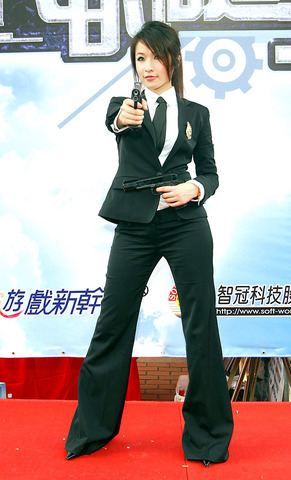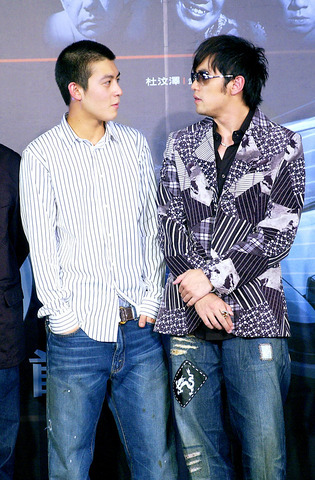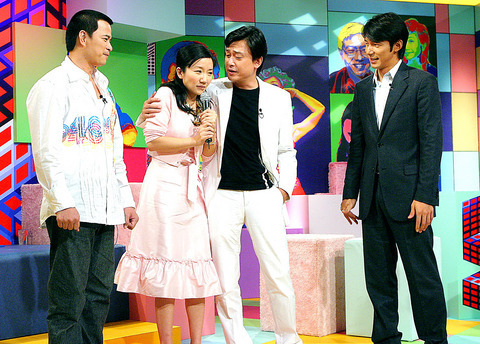Starring Jay Chou (周杰倫) and teen-idols Edison Chen (陳冠希) and Shawn Yue (余文樂) from Hong Kong, the most talked-about Chinese movie of the year, Initial D (頭文字D), finally hit the big screen last Friday in Taiwan. With a string of terrible reviews because of the poor acting of its protagonist, the movie nevertheless grossed over NT$7 million in ticket sales in the first half day of screenings.
No surprises there. A blockbuster movie is never about good-quality performances and intelligent story-telling. It's all about grand promotions, well-plotted publicity stunts and behind-the-scene stories that the press can happily chew on for weeks.
The three young male idols

PHOTO: TAIPEI TIMES
involved know all the tricks. And like their female counterparts, they understand the importance of lavish outfits and accessories. Showing up at their press conference in Taipei, Shawn smiled confidently with his NT$160,000 necklace (almost invisible to the untrained eye) and Edison strutted out of the car in a pair of Adidas sneakers worth NT$40,000. As for Jay, he didn't need to try hard -- or even try at all -- with the title King of Mando-pop under his belt.
It hasn't all been smooth sailing, though. Bad-boy Edison reportedly got pissed off by Chou's steeply rising star and felt frustrated enough about being ignored by the media during promotional tours to make a noise about it.
Petty break-up news from the self-absorbed celebrity circle is as follows: Following the break-ups of Big S (大S) and Lan Zheng-long (藍正龍), Elva Hsiao (

PHOTO: TAIPEI TIMES
TV hostess Momoko Tao (陶子), on the other hand, happily showed off her two-year relationship with actor Lee Lee-ren (李李仁) by talking about the possibility of marriage in a promotional event on Monday. As an ordinary-looking woman, Tao admitted she once wanted to get her whole body revamped with plastic surgery, but said, as reported by the Apple Daily (蘋果日報), ``on second thought, there must be a beautiful side of me -- otherwise how could I have landed such a great-looking boyfriend?''
Truth is, wealth and power can can get most people (male or female) what they want and they don't have to be good-looking to get it.
Although she's one of the least-favored movie stars in the eyes of the Chinese press, Zhang Zi-yi (章子怡) has been gaining increasing popularity and recognition in the West. She has recently been honored by becoming a member of the Academy of Motion Picture Arts and Sciences, and she's so hot there that the big-hearted Chinese media have accused her of being a snob who's forgotten where she came from and who doesn't give a shit about Chinese-speaking markets.

PHOTO: TAIPEI TIMES
Hong Kong beauty Maggie Q is another Asian actress who's made it to Hollywood. According to the Great Daily News (
The four-piece boy band F4 is going to have a girl version soon, according to the local media. But while the boy band uses pretty faces as their selling point, the F4 girls will take pride in their voluptuous breasts -- that is, all four band members are required to have F-cup equipment. The band has already recruited three big-bosomed babes, all college girls. If you want to join the band and have the right stuff, hurry to get your application form in. This is your chance to be counted and join "Fantasy 4."

In the March 9 edition of the Taipei Times a piece by Ninon Godefroy ran with the headine “The quiet, gentle rhythm of Taiwan.” It started with the line “Taiwan is a small, humble place. There is no Eiffel Tower, no pyramids — no singular attraction that draws the world’s attention.” I laughed out loud at that. This was out of no disrespect for the author or the piece, which made some interesting analogies and good points about how both Din Tai Fung’s and Taiwan Semiconductor Manufacturing Co’s (TSMC, 台積電) meticulous attention to detail and quality are not quite up to

April 21 to April 27 Hsieh Er’s (謝娥) political fortunes were rising fast after she got out of jail and joined the Chinese Nationalist Party (KMT) in December 1945. Not only did she hold key positions in various committees, she was elected the only woman on the Taipei City Council and headed to Nanjing in 1946 as the sole Taiwanese female representative to the National Constituent Assembly. With the support of first lady Soong May-ling (宋美齡), she started the Taipei Women’s Association and Taiwan Provincial Women’s Association, where she

Chinese Nationalist Party (KMT) Chairman Eric Chu (朱立倫) hatched a bold plan to charge forward and seize the initiative when he held a protest in front of the Taipei City Prosecutors’ Office. Though risky, because illegal, its success would help tackle at least six problems facing both himself and the KMT. What he did not see coming was Taipei Mayor Chiang Wan-an (將萬安) tripping him up out of the gate. In spite of Chu being the most consequential and successful KMT chairman since the early 2010s — arguably saving the party from financial ruin and restoring its electoral viability —

It is one of the more remarkable facts of Taiwan history that it was never occupied or claimed by any of the numerous kingdoms of southern China — Han or otherwise — that lay just across the water from it. None of their brilliant ministers ever discovered that Taiwan was a “core interest” of the state whose annexation was “inevitable.” As Paul Kua notes in an excellent monograph laying out how the Portuguese gave Taiwan the name “Formosa,” the first Europeans to express an interest in occupying Taiwan were the Spanish. Tonio Andrade in his seminal work, How Taiwan Became Chinese,